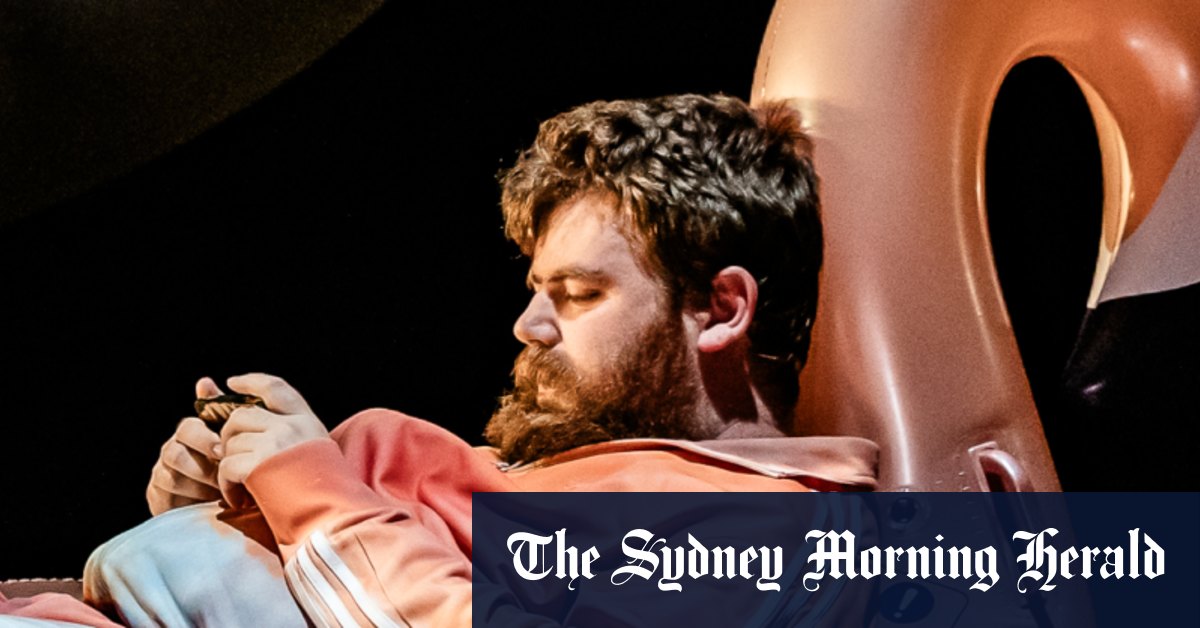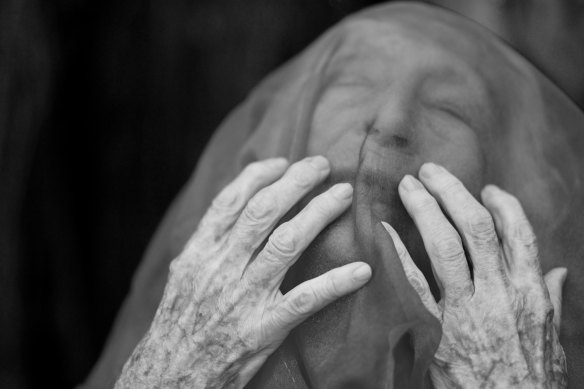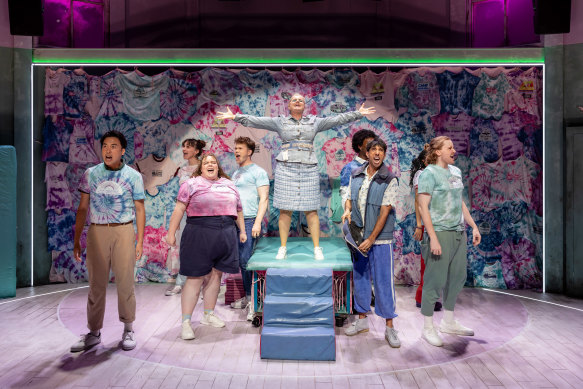
At the side of the stage, Laherty blends middle-management wastrel with sage. He reminds us pain and death are real, and theatre isn’t. But mostly he plays solitaire or doomscrolls though soft porn and animal videos. In this Kafkaesque world, little wonder Mainwaring eventually calls a helpline.
The pre-recorded message – which shifts from treacly platitude to profane abuse – is a comic highlight in a piece in which the dominant tone is ominous. The latter is aided by Zoë Barry’s sound design, which includes pulsing, metal clanging and an occasional, annoying tinkly ringtone. Those sounds, according to a program note, were “assembled from field recordings of bad things”.
The work itself is an assemblage of disparate components of meta theatre, existential angst and workplace politics. Yet, the whole does not feel greater than the multiple parts. The one-hour, group-devised show is concisely directed by Tamara Searle and Ingrid Voorendt.
The four actors, who each create clear but nameless characters, are compelling to watch. Anna Cordingley’s fine set is central to a coup de théâtre towards the end which brings tentative hope to a work that takes a dark view of human relationships.
DANCE
AFTERWORLD
The Neilson Nutshell, January 7
Until January 11
Reviewed by CHANTAL NGUYEN
★★★
The main drawcard of Afterworld is that it is the final posthumous performance of Eileen Kramer, the remarkable Bodenwieser Ballet dancer who died last year aged 110 after a long life in witness to 20th century modern dance.
Choreographed by Sue Healey to Laurence Pike’s percussive score, Afterworld is inspired by the Grecian myth of Orpheus and Eurydice, and imagines itself as a requiem exploring the rituals of life and death. References to the myth are overwhelmingly impressionistic rather than story-like.
Kramer had hoped to perform live as Eurydice, but following her death she appears as an enigmatic figure in film projection, gazing at the audience through tree branches, veils, and sunbeams. Her fingers gracefully flutter around her wizened face and deep liquid eyes, luminous with an expression borne from decades of artistry.

The late Eileen Kramer is an enigmatic figure in the performance.Credit: Sue Healey
Afterworld’s costumes and sets are appropriately requiem-themed: all shroud-like robes and diaphanous screens fluttering and sliding across the stage. There are five dancers (Nadiyah Akbar, Josh Freedman, Benjamin Hancock, Taiga Kita-Leong and Siobhan Lynch), who are artistically committed and technically outstanding, embodying Healey’s choreography with sinewy clarity. They move with the discipline and unity one would usually expect from an established company. In particular Kita-Leong, in a warlike solo danced with two wooden stakes, is a revelation of power and clean-lined athleticism.
Pike’s music is also strong, a buffet of driving rhythms set against ambient soundscapes. An excellent musician, Pike performs live, his drum kit set up stage left on a little platform edged with lights.
Despite all these strengths, Afterworld’s choreography often feels insipid and thinly paced, especially in the ensemble work. Some scenes exhibit wonderful conceptual strength: Kita-Leong’s solo; another solo where the excellent Freedman dances with two cymbals; and a trio where Freedman, Hancock, and Lynch morph into Cerberus, the three-headed dog who guards the underworld.
But otherwise the various parts of Afterworld do not quite coalesce, and the movement vocabulary lacks the definition and uniqueness necessary to give a dance thematic lucidity. Since Afterworld already takes a highly impressionistic approach to its foundational concepts, the overall effect was one of conceptual haziness.
THEATRE
Converted!
Australian Theatre for Young People
Rebel Theatre, January 8
By Cassie Tongue
★★★½
It’s 2025, and conversion therapy – the controversial, pseudo-scientific process of attempting to change someone’s sexual orientation or attractions – is still legal in certain parts of Australia. It was banned in New South Wales only last year.
Converted!, a new musical with book, music and lyrics by Vic Zerbst (The Feed) and co-composer Oliver John Cameron, is a joyful coming-of-age musical set at a conversion camp that gives us a chance to celebrate liberation from the therapy’s harmful ideas as the attendees at Camp Fix Yourself soon realise they don’t need any fixing.

Converted! features genuinely funny punchlines and strong performances.Credit: Daniel Boud
Maya (Megan Robinson) is recruited to the camp by Glenda (Cassie Hamilton), the school counsellor she idolises, and is determined to please her. But when she meets Bone (Teo Vergara), a rebellious heartthrob with a heart of gold, sparks fly.
The camp, led by Mr and Mrs Doctor (Nat Jobe and Helen Dallimore, both delightfully feasting on the scenery), is a tie-dyed, misguided mess of misappropriated therapy-speak, and it keeps its teen attendees in line with the threat of a ritualised, shame-filled reckoning with a “mirror of truth”.
But these kids won’t have their light dimmed by the camp that easily. Maya and Bone are drawn to each other, even as Maya and fellow camper Horace (Teo Persechino) are nudged towards a more heteronormative coupling. There’s also Sammy (Melody Kiptoo), who doesn’t know where to point her “compass of attraction, and Denver (Redd Scott), who, as a nonbinary camper, doesn’t neatly align with the aggressively gendered roles of the camp. Kyle (Ashley Garner) is less of a problem for the Doctors: his parents thought they were dropping him off at basketball camp.
When the campers band together and find their joy amidst the brainwashing, it’s a delight. Zerbst’s musical is charmingly old-school in structure, with songs that favour character and plot over overworked metaphor – Zerbst’s trademark killer comic timing crackles in the book scenes and in small musical moments – though Hayden Tonazzi’s largely playful direction doesn’t always move harmoniously with the pop-focused score, leaving awkward transitions between songs and scenes; the production feels a little unresolved.
Like most new Australian musicals, Converted! is still under-done in its debut and could do with another round of edits: main character Maya is more idea than person, a blank slate of narrative world-building and ideology, and the central love story between Maya and Bone is too shorthanded for its happy-ending payoff to feel earned. The music is competent and clear but almost tentative in sound, flattening out the edge of rock and the giddy, uplifting heartbeat of disco to chug dutifully along.
Its plot points don’t all neatly converge, and a few ideas or plot threads hang half-heartedly alongside the main narrative. But this is all fixable, and already there’s much to love here: genuinely funny punchlines, strong performances, and an effective act-two reprise that reaches past all the comedy to land in the heart. It’s already a good time: with a little more time and care, it will soar.
Rufus Wainwright
Sydney Opera House, January 8
Reviewed by JAMES JENNINGS
★★★★
Whether playing a stripped-back set is a reflection of the current economic reality of touring with a full band or simply an artistic choice for a musician to present their work in a more intimate fashion, it seems to be happening a lot lately, with Nick Cave and Thom Yorke’s pared-back Sydney shows last year two recent examples.
Canadian-American singer-songwriter Rufus Wainwright is the latest visitor adding to this trend, and with 11 studio albums under his belt, there’s plenty of back catalogue to be given the bare bones, piano-and-acoustic-guitar treatment.
Wainwright’s powerful vibrato alone is enough to fill the Concert Hall and captivate the audience, which he ably does on show highlight Go or Go Ahead, a song about addiction that’s sung so beautifully you can feel the crowd collectively hold its breath.
Extremely personal subject matter is something Wainwright doesn’t shy away from, with two songs dedicated to his folk-singer parents, the late Kate McGarrigle (the tender Beauty Mark) and Loudon Wainwright III (Dinner at Eight, which Wainwright tells us was written directly after a storming argument with his father).
If that all sounds a bit dour, Wainwright is anything but, earning laughter throughout the show with his stage banter, and sometimes within the songs themselves. One of the biggest laughs of the night comes during “a new song called Old Song”, where Wainwright sardonically sings “can’t we go back to the fall / when everyone was miserable across the board”.
There’s a welcome surprise when Wainwright introduces Melbourne’s Folk Bitch Trio to the stage, tonight’s opening act whose stunning harmonies earned them headliner-worthy applause. Wainwright met the group at a recent Perth show and invited them along for the rest of the tour to accompany him on songs from 2023 album Folkocracy. It’s a wise decision: the team-up is so effective on gorgeous covers of Moondog’s High on a Rocky Ledge and Neil Young’s Harvest that you can only hope this leads to further collaboration.
Wainwright is back in solo piano mode for covers of Cora Vaucaire’s La Complainte de la Butte (from Moulin Rouge) and Leonard Cohen’s Hallelujah. The latter may be the most over-covered song of all time, but Wainwright has the heart and hopeless romantic vibes to do it justice, making you pleased he chose to go it alone tonight, whatever the reason may be.



